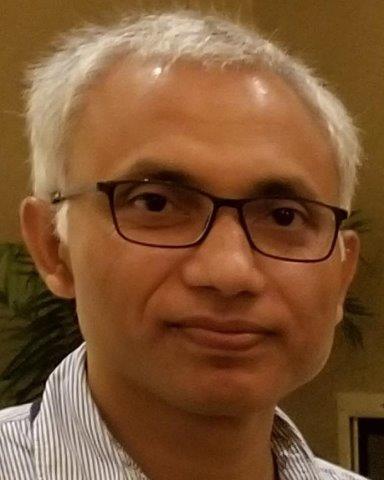Traffic and Energy load balancing in cooperative dual-powered green cellular networks
14h00 - 15h10 | ISCTE-IUL, Building II, Room C202
 Prof. Swades De
Prof. Swades De
Indian Institute of Technology Delhi
Email: swadesd@ee.iitd.ac.in
Topic: Wireless sensor nodes are characterized by limited energy sources. Although the interests in wireless connectivity is ever-increasing and the needs for Internet-of-Things (IoT) applications, such as, automated remote access, monitoring, and control are well-appreciated, widespread adoption of networked wireless devices is largely constrained by their affordable deployment and maintenance costs and convenience of their long-term usage. To this end, while energy efficient protocol design is a key for long-lasting network operation, energy harvesting aware solutions are becoming widely popular as green and affordable approaches towards sustainable network operation. Since ambient energy harvesting is not reliable or suitable in many field applications, an interesting approach is charging them via wireless energy transfer. In this presentation, we will discuss limitations of radio frequency (RF) energy transfer, performance of multihop RF energy transfer, and some of the use cases of RF energy transfer combined with wireless information transfer. In particular, we will discuss the possible ways of improving RF energy transfer efficiency through passive and active distributed beamforming. Throughout the presentation, we will mutually corroborate our experimental findings and analytical intuitions in a few application scenarios.
Biography: Dr. Swades De is a full professor with the Department of Electrical Engineering and an Institute Chair Professor at Indian Institute of Technology Delhi. Dr. De’s research interests are broadly in communication networks, with emphasis on performance modeling and analysis. Current directions include energy harvesting communication networks, broadband wireless access and routing, network coexistence, smart grid networks, and smart IoT. To date, he has published over 230 articles in top journals and well-known conferences, a few book chapters, an edited book, 1 US/EU/WO patent, and filed 9 Indian patents and 6 US/EU/World patents.
Prof. De currently serves as an Area Editor for IEEE Communications Letters, Area Editor for Elsevier Computer Communication, Associate Editor for IEEE Transactions on Vehicular Technology, IEEE Wireless Communications Letters, and IEEE Wireless Communications Magazine. Prof.
De is a Fellow of Indian National Academy of Engineering, Fellow of National Academy of Sciences, India, Fellow of The Institute of Engineers, India, and Fellow of IET, UK.
15h10 - 15h30 | Coffee Break
Energy and Spectral-efficient resource allocation algorithm for heterogeneous networks
15h30 - 16h30 | ISCTE-IUL, Building II, Room C202
 Prof. Ender Ayanoglu
Prof. Ender Ayanoglu
University of California Irvine
Email: ayanoglu@uci.edu
Topic: In this talk, the tradeoff between energy efficiency and spectral efficiency in multicell heterogeneous networks is investigated. Our objective is to maximize both energy efficiency and spectral efficiency of the network, while satisfying the minimum rate requirements of the users. We define our objective function as the weighted summation of energy efficiency and spectral efficiency functions. The fractional frequency reuse (FFR) scheme is employed to suppress intercell interference. We formulate the problem as cell-center boundary selection for FFR, frequency assignment to users, and power allocation. The optimal solution of this problem requires exhaustive search over all cell-center radii, frequency assignments, and power levels. We propose a three-stage algorithm and apply it consecutively until convergence. First, we select the cell-center radius for the FFR method. Second, we assign the frequency resources to users to satisfy their rate requirements and also maximize the objective function. Third, we solve the power allocation subproblem by using the Levenberg-Marquardt method. Minimum rate requirements of users are also included in the solution by using dual decomposition techniques. Our numerical results show a Pareto-optimal solution for energy efficiency and spectral efficiency. We present energy efficiency, spectral efficiency, outage probability, and average transmit power results for different minimum rate constraints. Among other results, we show that, in a particular setting, 13% energy efficiency increase can be obtained in a multicell heterogeneous wireless network by sacrificing 7% spectral efficiency.
Biography: Ender Ayanoglu has been a Professor in the Department of Electrical Engineering and Computer Science, University of California, Irvine, Irvine, CA, where he served as the Center for Pervasive Communications Director and Computing and held the Conexant-Broadcom Endowed Chair. His past accomplishments include the invention of the 56K modems, the characterization of wavelength conversion gain in Wavelength Division Multiplexed (WDM) systems, and diversity coding, a technique for link failure recovery in communication networks employing erasure coding introduced in 1990, prior to the publication of the first papers on network coding. He served as the Editor-in-Chief of the IEEE Transactions on Communications from 2004 to 2008. From January 2015 until December 2016 he served as the Editor-in-Chief of the IEEE Journal on Selected Areas in Communications – Series on Green Communications and Networking.
Photo Gallery


















